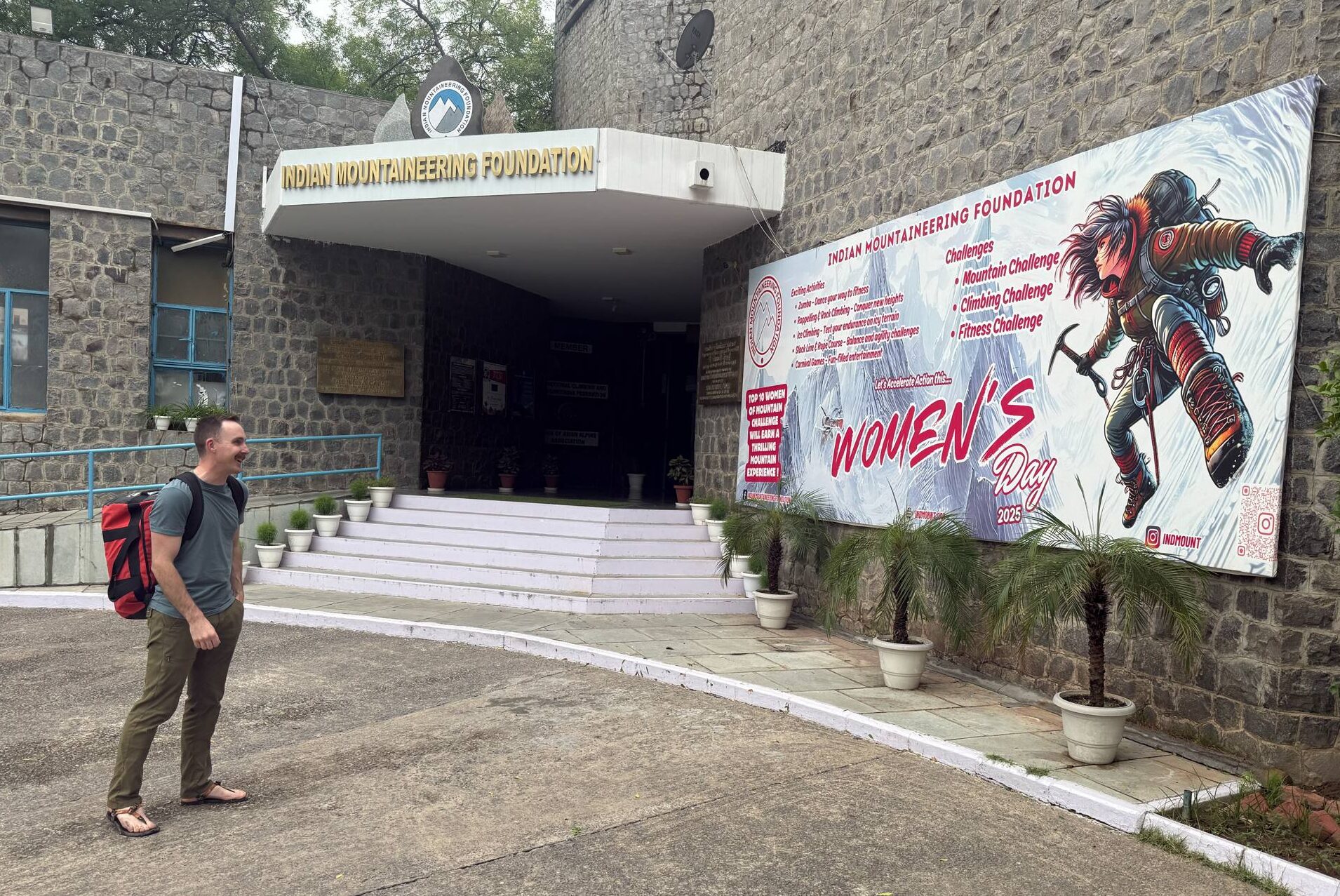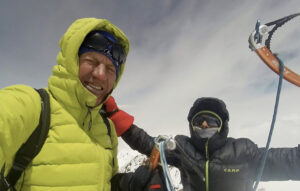Escalating hostilities between India and Pakistan have thrown spring climbing expeditions into disarray, and even the June-July Karakoram season is uncertain. Sean McLane and Vitaliy Musiyenko of the U.S. flew to India last week to attempt 5,935m Kishtwar Shivling, but the conflict in Kashmir has forced them to adapt on the fly and move to Garhwal instead.
At least, they made it to the mountains. But today, as flights to Pakistan are canceled and India restricts or halts operations at several airports, the pair wonders whether their expedition will continue. And what of the many climbers and trekkers who’ve not yet packed their bags?
Flying into uncertainty
Musiyenko and McLane obtained a Cutting Edge Grant from the American Alpine Club to attempt a new route on Kishtwar Shivling in India’s Kashmir. They were preparing to leave when a terrorist attack left 27 people dead not far from where they planned to start. The attack, claimed by the Pakistan-based terrorist group Lashkar-e-Taiba, re-ignited the conflict between the two countries over long-disputed Kashmir. India accused Pakistan of being involved in the attack, which Islamabad denied, according to CNN.
“I was monitoring the situation from home after the terrorist attack and saw articles on April 27-28 about Jammu and Kashmir being closed to trekkers,” Vitaliy Musiyenko told ExplorersWeb. “My flight to India was on the 29th. I started researching potential Plan Bs a day before departure. Our logistics company said it was all ok with going to J&K, but when we landed, one of the people who works for the company and lives in the area met with local officials. They confirmed that it’s not allowed to climb there.”
Adaptation required
Muyisenko considered some options, like approaching Kishwar from the northeast, via Zanskar, which is still technically open to climbing. However, the uncertainty about how the situation might evolve made them reconsider.
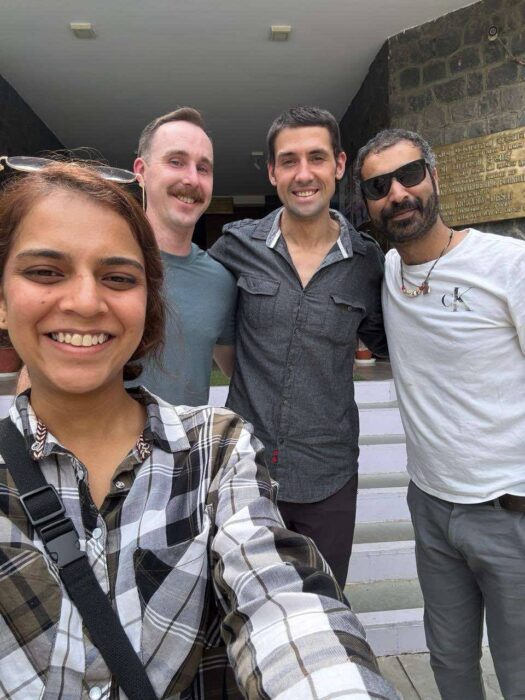
McLane and Musiyenko with their liaison officer, Shri Ayushman Singh. In the foreground, the expedition organizer’s niece, Ms. Aarushi, took the photo.
Musiyenko notes he is a climber and an ER nurse, and acted as such: “I am open to rolling with the punches and adapting to big changes,” he said.
Within 24 hours, they had made a decision: They would climb in India but in a different area.
“We ended up applying for Chaukhamba 3,” Musiyenko told ExplorersWeb. “It looks like a very challenging peak, supposedly still unclimbed and a totally new area to my partner and me, so we are at least as excited about it as we were about Kishtwar.”
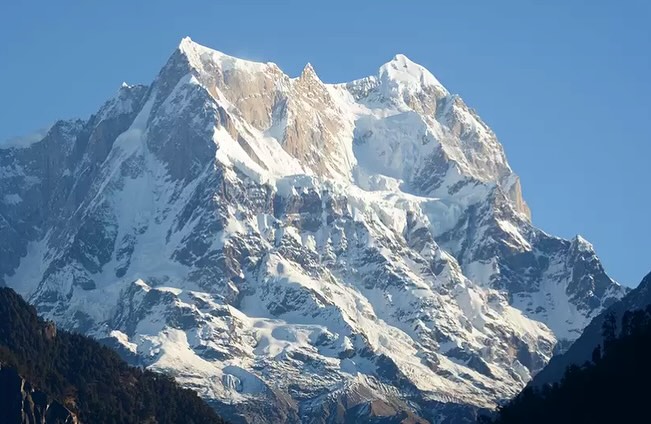
Chaukhamba III. Photo: Vitalyi Musiyenko/Facebook
Chaukhamba III
McLane and Musiyenko left for Rishikesh, the start of the trek, last weekend. They will be off-grid while they climb 6,974m Chaukhamba III, located in the Gangotri group of India’s western Garhwal Himalaya.
Chaukhamba III is rarely visited but had some unexpected drama last September, when Fay Manners of the UK and Michelle Dvorak of the U.S. had a close call while attempting its east buttress and had to be rescued.
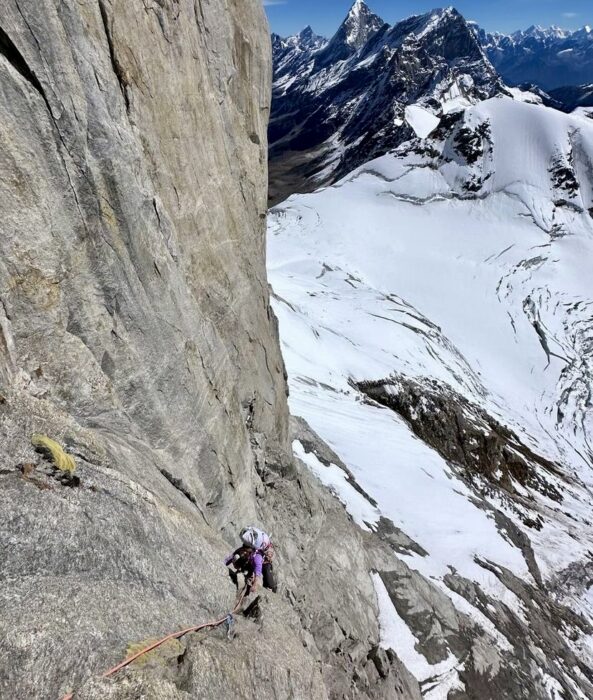
A rock buttress section on Chaukhamba III, in the Garhwal Himalaya. Photo: Michelle Dvorak
A different line
They have not mentioned if they have a particular route in mind, except that it will not be the same one that Manners and Dvorak took. The two women have just received a Grit&Rock award to return to Chaukhamba III to finish their route. But if Musiyenko and McLane succeed, they will lose the first ascent.
“Hopefully, they can return and finish their business,” Musiyenko said. “If we had more time to look, I’d prefer not to attempt peaks that others are trying, but there are just not many of that size and difficulty, potentially unclimbed, which are inspiring and easy to get a permit for.”
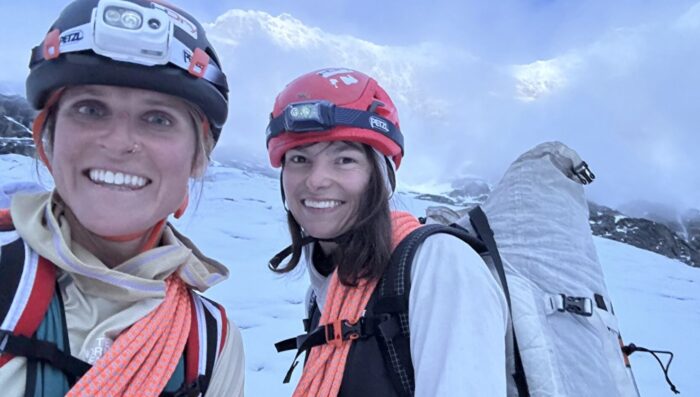
Fay Manners, left, and Michelle Dvorak during their attempt on Chaukhamba III last year. Photo: Fay Manners
Situation uncertain
Jammu and Kashmir is currently closed to foreigners and will likely remain so for the rest of the season. Other mountain areas remain open, but the situation is fluid.
Today, before dawn, India retaliated for the April 22 terrorist attack by bombing objectives reportedly linked to the terrorist group in Pakistan and Pakistan-administered Kashmir. Pakistan has promised to respond to today’s strike.
Even if some mountain areas are unaffected by the hostilities, getting there may become a problem.
As we wrote in a story earlier today, most commercial airlines have avoided flying into Pakistan since the attack. India had already closed its airspace to flights from Pakistan, but today, after its missile strike, it further restricted it. Indian authorities have canceled over 200 domestic and international flights and closed 18 airports, including Srinagar, Leh, Amritsar, and Chandigarh, India Today reports.
Far enough from trouble?
Communication in backcountry India is complex even in peacetime, since the country bans satellite phones and InReach devices. Musiyenko and McLane are now out of touch and probably on their way to base camp. We won’t hear from them until they return. However, they and their liaison officer will surely have contact with the local outfitter. So far, the skirmish has not affected the Garhwal Himalaya, in the Indian state of Uttarakhand. But this could change.
Before leaving for the mountains last Friday, Musiyenko shared how lucky he and his partner were not to have traveled to India before April 22. If they had been in Kashmir when the attack took place, “I could see having to leave the area in the middle of our trip,” Musiyenko reflected.
With the worsening situation, it is unclear whether Garhwal will be far enough away from trouble. The uncertainty also affects those preparing to travel in the next months. Ethan Berman, Maarten van Haeren, and Sebastian Pelletti were heading for Ultar Shar today but didn’t get any further than the airport lobby in Calgary. Their flight to Pakistan was canceled before they even boarded the plane. The entire summer Karakoram season is in jeopardy.
For now, we can only hope the situation improves before Fay Manners and Michelle Dvorak return to Chaukhamba III in the fall. At least the women have plenty of time to devise a Plan B.
